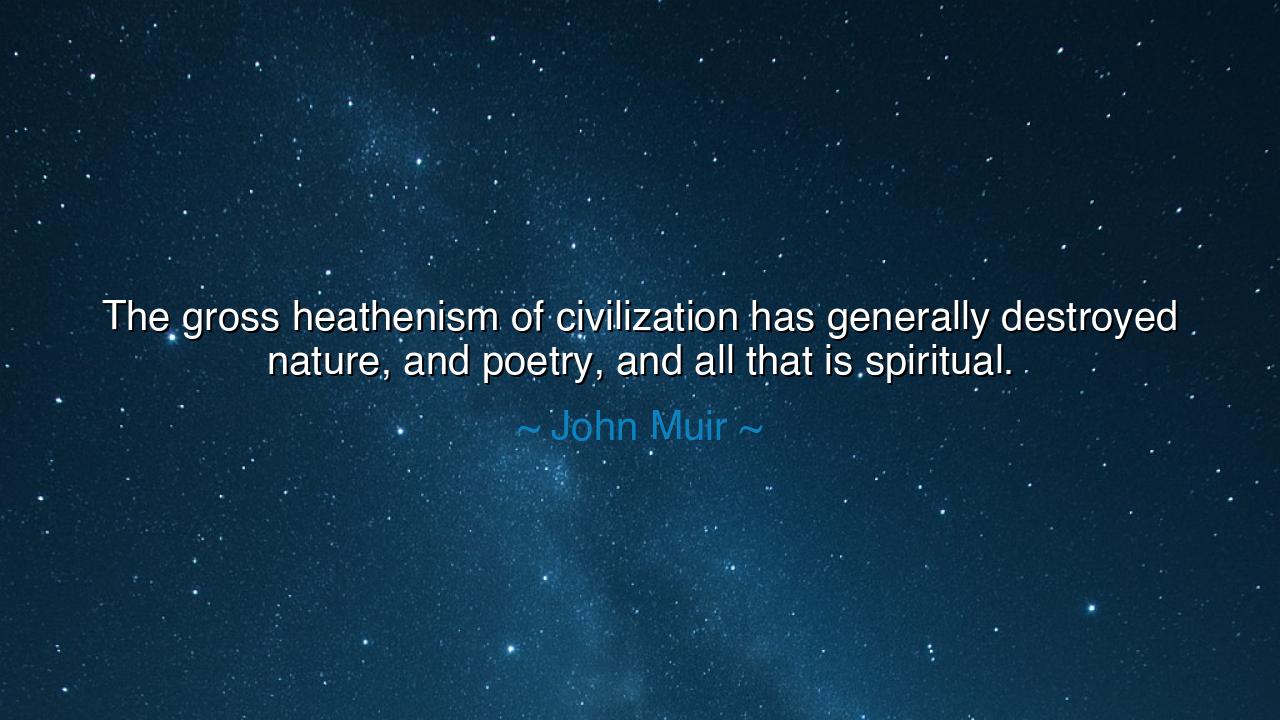
The gross heathenism of civilization has generally destroyed
The gross heathenism of civilization has generally destroyed nature, and poetry, and all that is spiritual.






The great naturalist John Muir, prophet of the wilderness and defender of the mountains, once wrote with grief and fire: “The gross heathenism of civilization has generally destroyed nature, and poetry, and all that is spiritual.” In these words, he set his face against the arrogance of modern man, who, in his hunger for power and profit, lays waste to the very sources of beauty and life. Here, civilization is not praised as progress, but condemned as a false god, worshiped at the cost of the earth, of art, and of the spirit.
To Muir, the destruction of nature was not only a crime against beauty but a severing of the human soul from its roots. He saw forests cut down, rivers poisoned, and mountains scarred by mines, all in the name of advancement. Yet where civilization saw only timber and stone, he saw cathedrals of living trees and the sacred silence of valleys. To destroy them was to extinguish a form of worship, to desecrate temples not built by human hands but by the eternal artistry of creation itself.
In this destruction, poetry too was lost. For poetry is not born in noise and smoke, but in the quiet communion of man with the infinite. The song of the bird, the rush of the waterfall, the whisper of the wind through pine boughs—these are the verses that awaken the poet’s tongue. When civilization tramples the fields, blackens the skies, and silences the rivers, it also silences the muse. What remains is a barren tongue, speaking only of machines and commerce, unable to capture the grandeur of the human spirit.
And with nature and poetry slain, spirituality itself is diminished. Muir believed the wilderness was the true sanctuary of the divine, where one could feel the presence of God in every flower and stone. To destroy nature is to destroy the ladder by which humanity ascends to heaven, the mirror in which it sees the eternal. Thus, the so-called triumphs of civilization—its railroads, its factories, its cities—were to him not triumphs but acts of heathenism, for they bowed before idols of wealth and progress while sacrificing all that is holy.
History provides witness. Consider the fate of the American bison, once numbering in tens of millions, reduced to near extinction in a few decades by the march of civilization. Where herds once thundered across the plains, silence fell. With them died not only a species but the songs, the myths, the sacred traditions of the native peoples who saw in the bison a spiritual partner. This is the very heathenism Muir condemned: that in seeking dominion, man destroys the very sources of his wisdom and meaning.
Yet Muir’s words are not only lament but warning, and within them lies hope. For he himself fought against this tide, and his struggle bore fruit in the creation of national parks, sanctuaries where nature, poetry, and the spiritual might endure. He proved that civilization need not be only a destroyer; it could, if guided by reverence, also be a protector. Thus, his cry is both an indictment and a call—to turn from destruction and embrace stewardship.
The lesson for us is clear: we must guard against the false gods of greed and heedlessness. We must walk gently upon the earth, preserving its beauty for future generations. Practically, this means protecting wild places, cherishing silence, cultivating art that springs from reverence, and making space in our lives for communion with the natural world. Let each person plant, preserve, and protect; let each family walk in the woods or gaze upon the stars, learning once more the poetry of creation.
Thus, Muir’s words echo like a prophet’s warning across the ages: the heathenism of civilization is real, but it need not be our destiny. If we choose reverence over ruin, if we defend the sacred wilderness, if we nurture poetry and the spiritual flame, then civilization may yet be redeemed. But if we forget, if we destroy, then we shall inherit only silence, and the earth will mourn the loss of its children.






AAdministratorAdministrator
Welcome, honored guests. Please leave a comment, we will respond soon